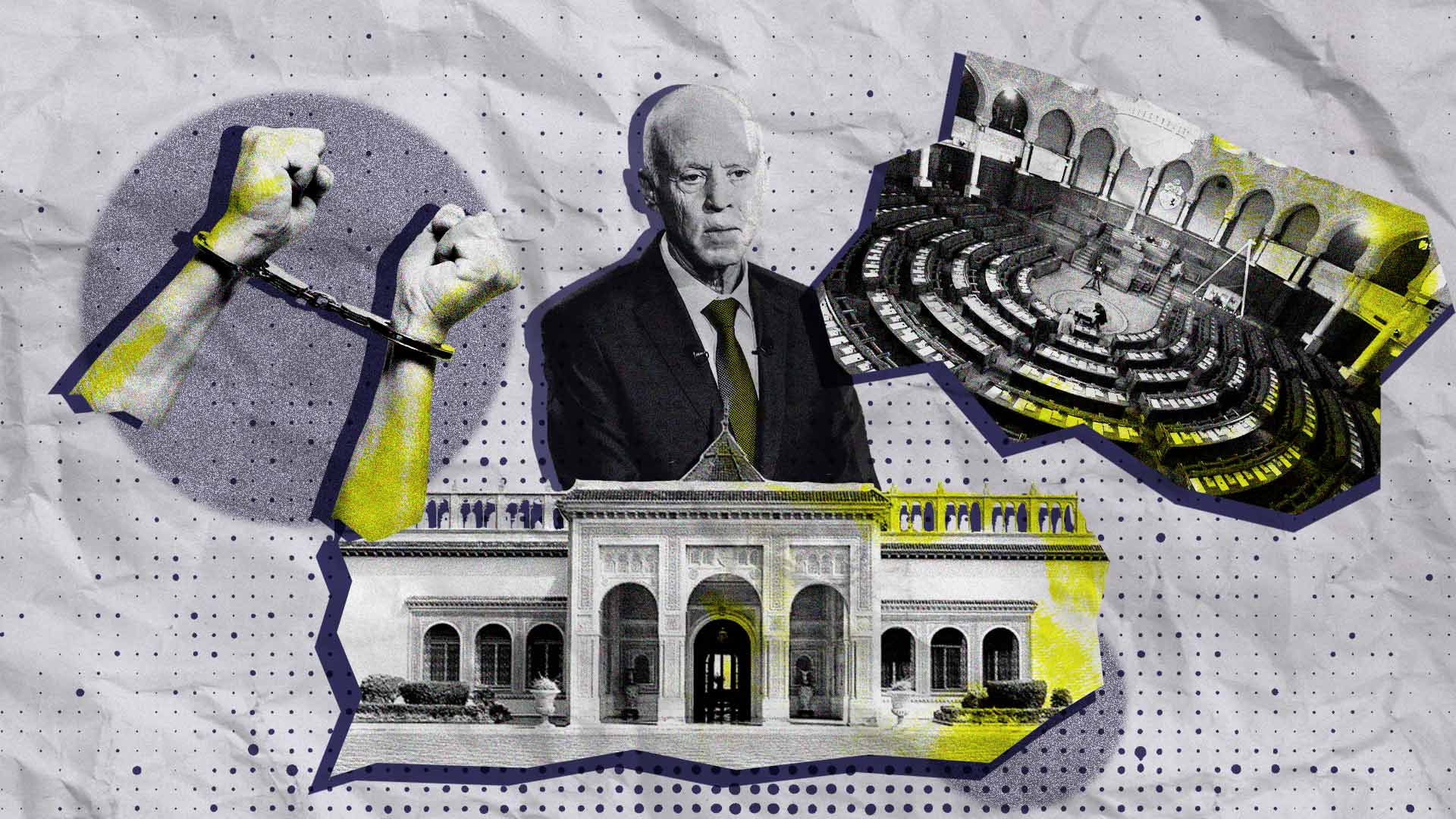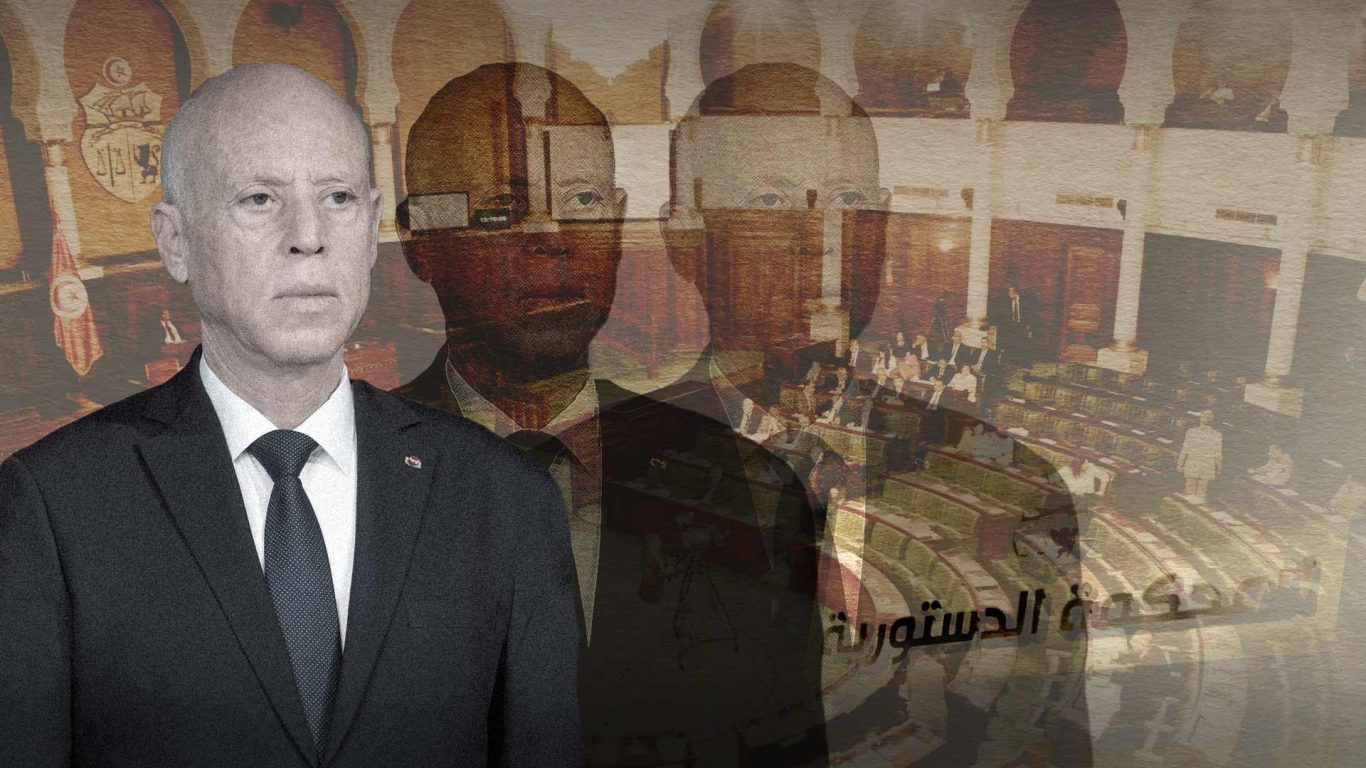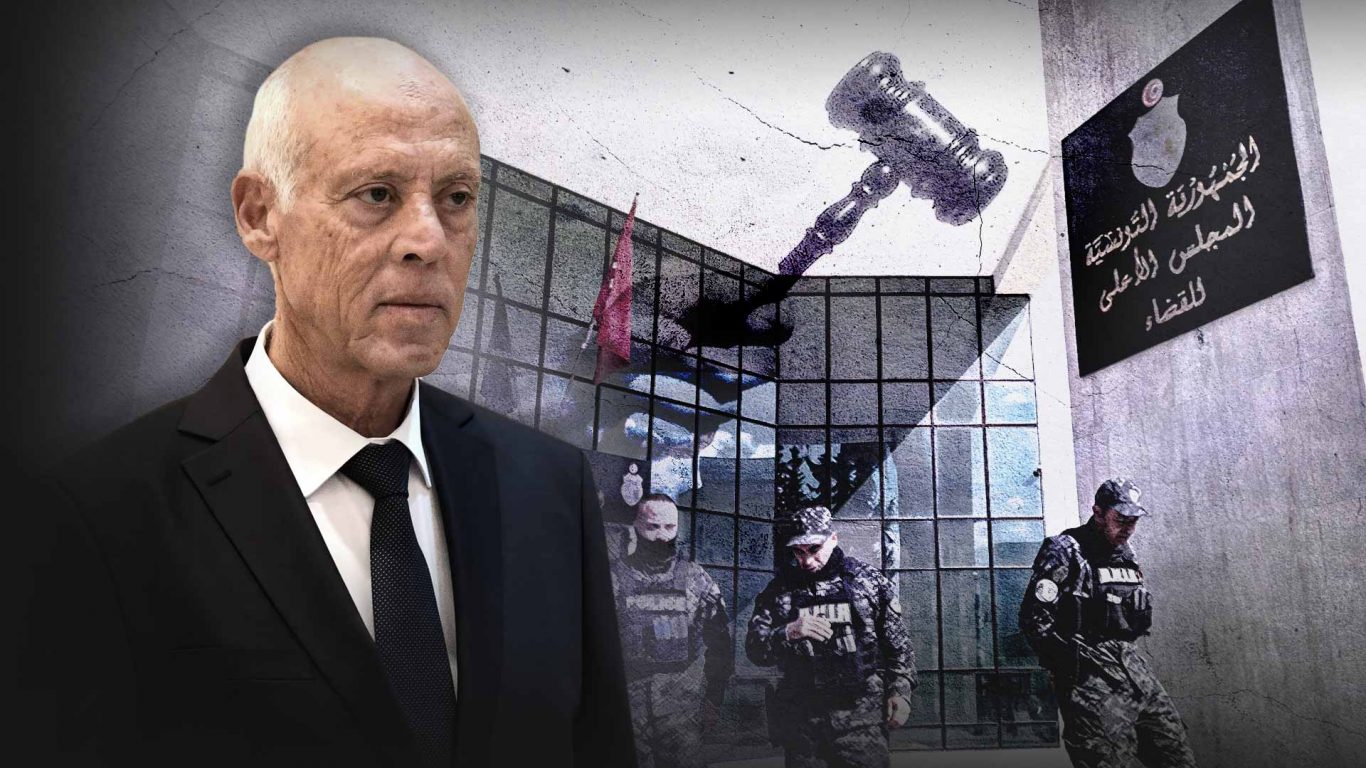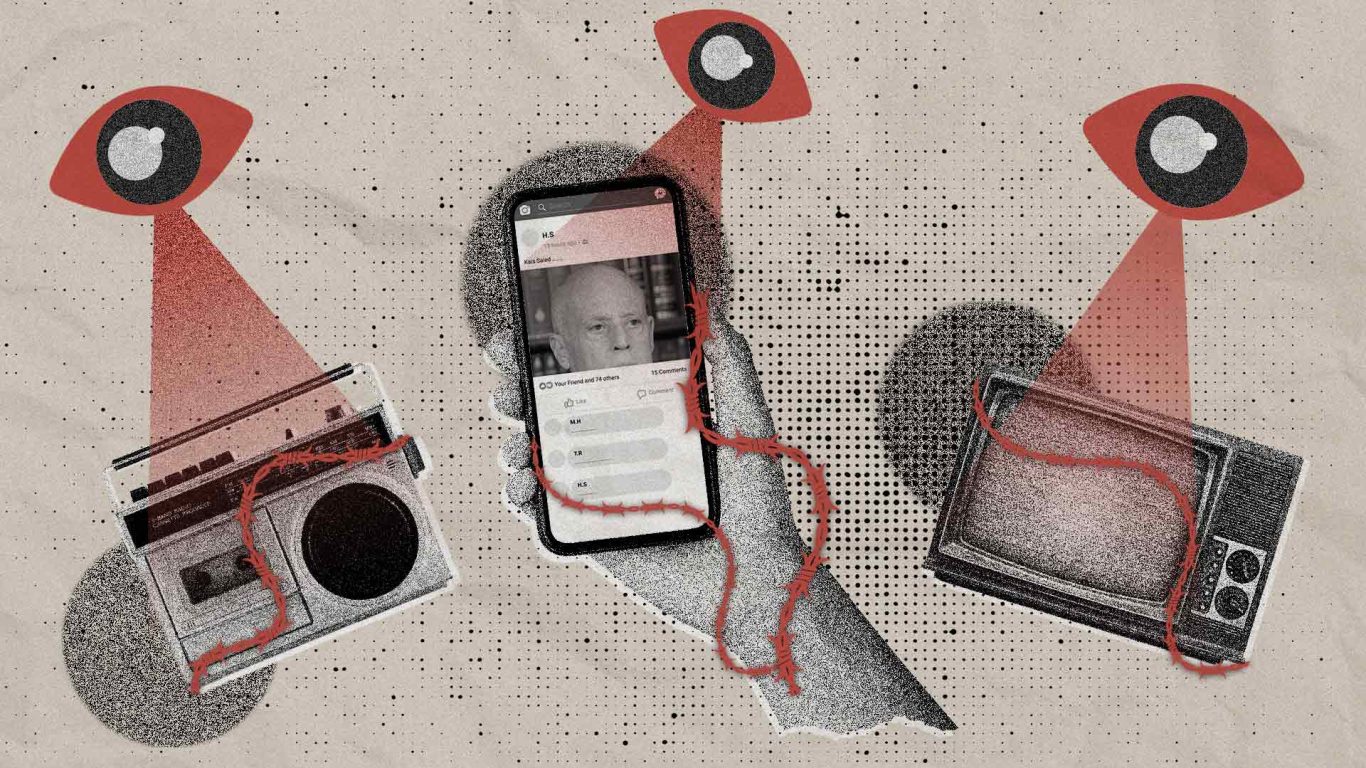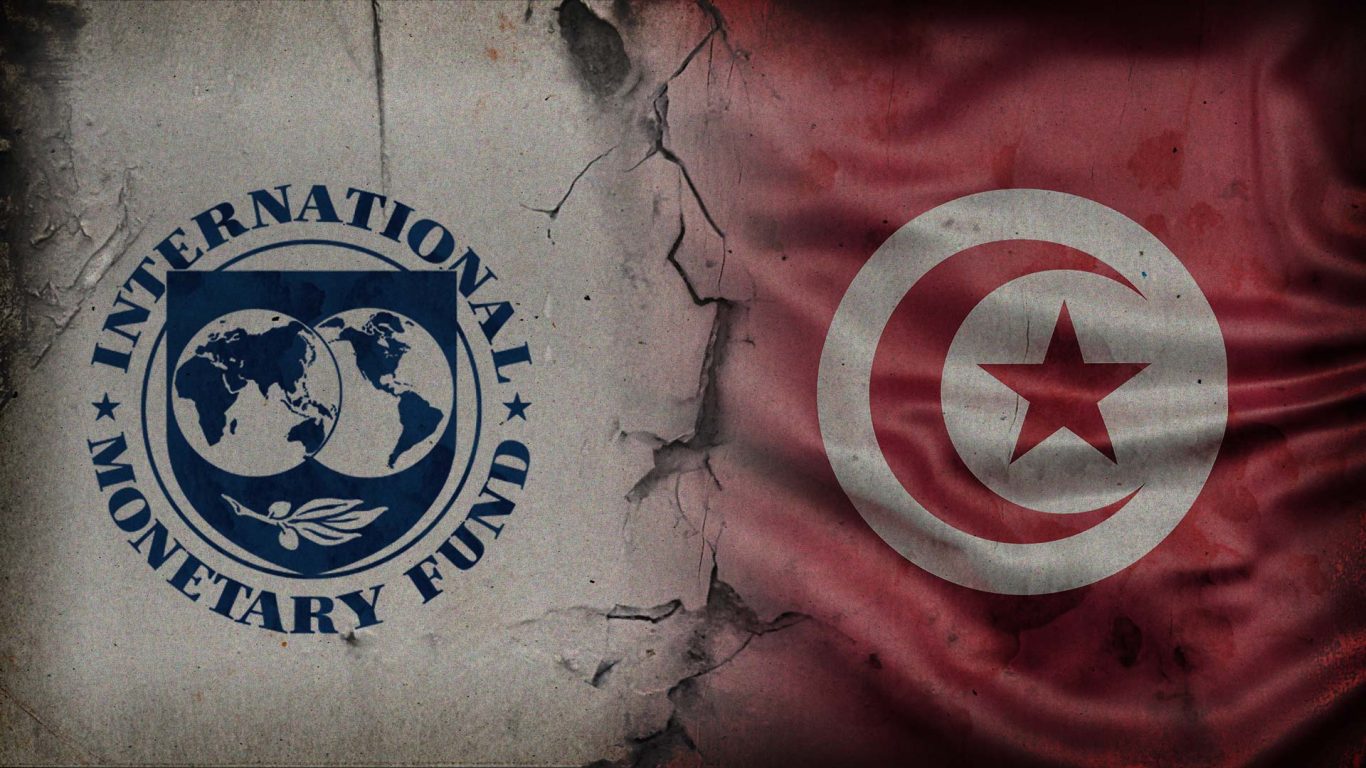Throughout 2022, President Saied issued an astonishing total of 81 Decree-Laws and 104 Presidential Decrees, completely bypassing any external scrutiny or control. He systematically dismissed all existing checks and balances, claiming that his actions were prompted by “imminent danger” and the alleged “infiltration of State institutions.”
“Although our democratic life may have been imperfect or barely functional before, we were at least fully aware of the issues at hand, even in the face of inaction,” reflects Zied Boussen, a public policy researcher at Pandora Consulting. “Today's system conceals its dysfunctions, and the true extent of the damage will gradually unfold over the years.”
Are these initiatives a manifestation of the ground-up building approach that the President has been pursuing since 2011 to comprehensively reform the existing political system? How have Kais Saied's measures influenced institutions, justice, and rights and freedoms throughout the country? This week, inkyfada examines each critical aspect of the President's promises to provide an assessment of his actions since July 25, 2021.
Broken promises
An I Watch report published on July 24 revealed that Kais Saied has made 49 promises since the introduction of the state of emergency. His commitments extend to a number of areas, from the independence of the judiciary to the safeguarding of rights and freedoms, and particularly the preservation of freedom of the press and expression. He also promised to improve the Tunisian people's purchasing power and to combat the rising prices of basic commodities. Respecting and promoting human rights were also among the objectives announced.
The organization's report found that by 2023, the President had only delivered on 5 of his promises, with a 90% failure rate in meeting his commitments.
The I Watch report stated that promises such as making a new history for Tunisia based on a real democracy, recovering 13 500 billion dinars by the end of June 2023, and respecting human rights, have not been respected or kept.
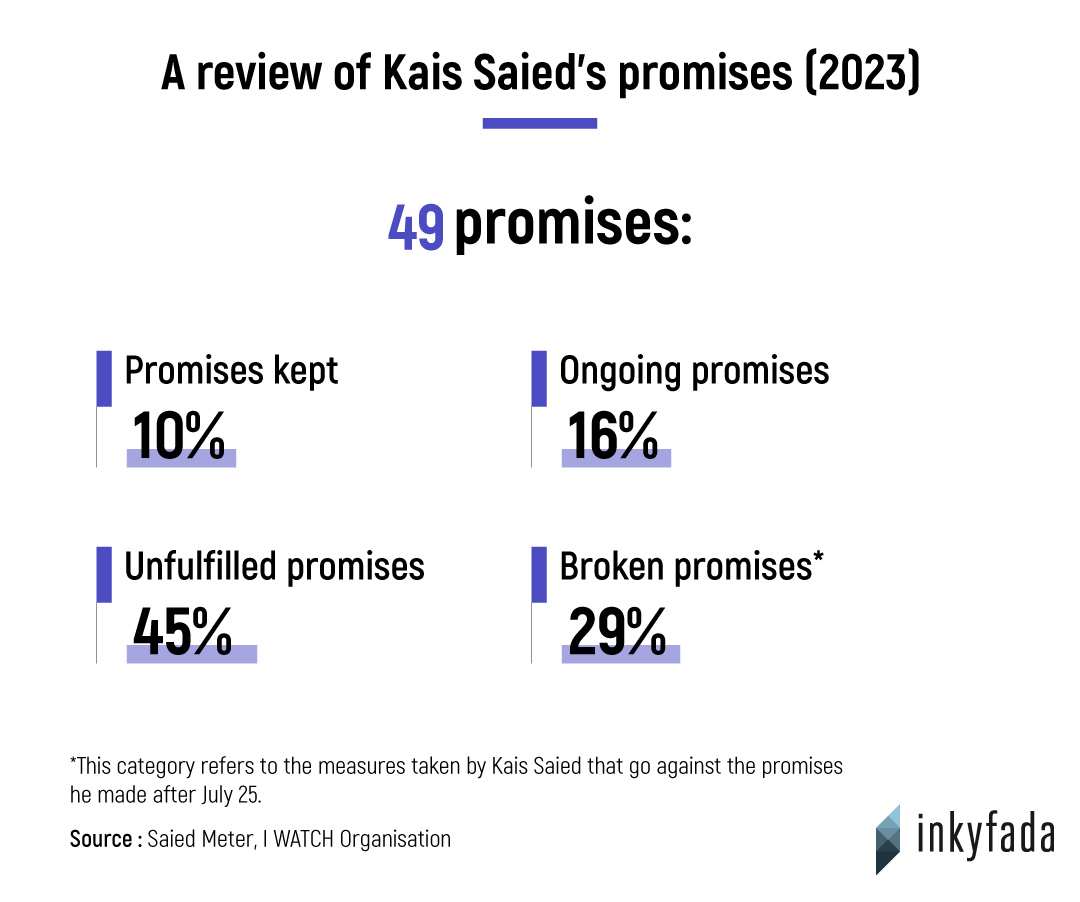
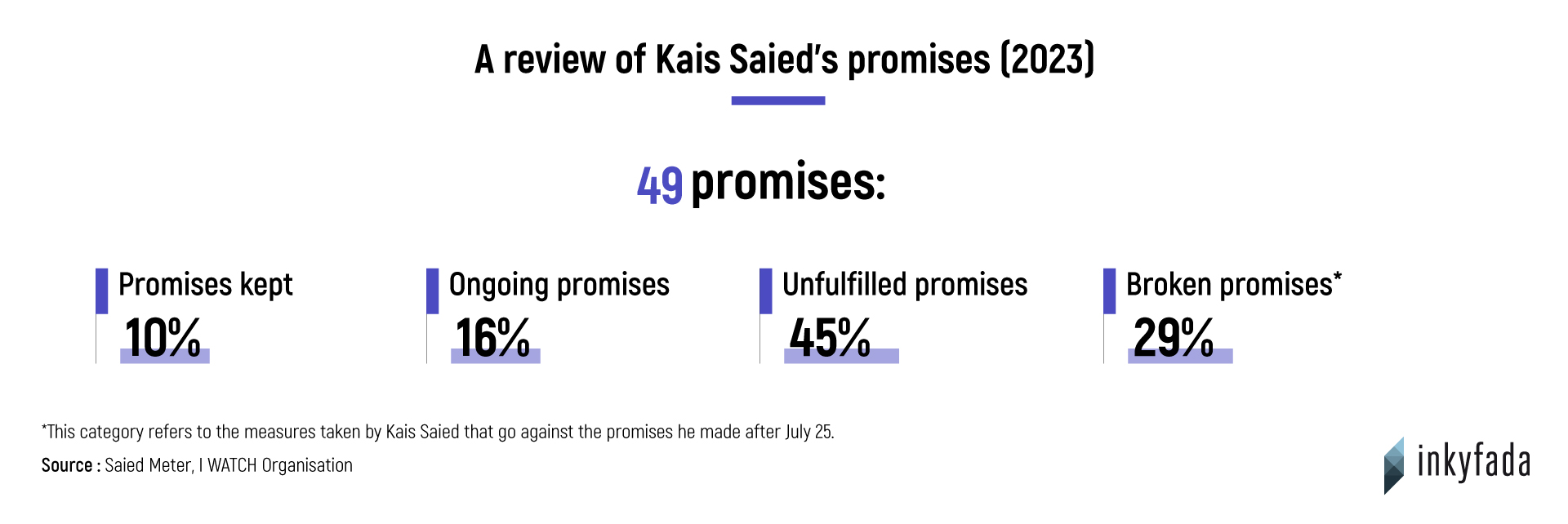
The destruction of independent institutions
Kais Saied has repeatedly pointed the finger at State institutions, accusing them of corruption, laxity, infiltration and more.. He has used these flaws to undermine the existing institutions, disempower them and seize their powers, with a view to carrying out the will of the people, the very essence of his project.
Presidential Decree 2021-117 marks the first stage in the implementation of the President's political project. This decree abolishes the Provisional Authority for the Control of the Constitutionality of Bills (IPCCPI), founded in 2014, which was supposed to continue operating until the establishment of the Constitutional Court.
A fundamental pillar of the republican system, the Court is designed to govern relations between the branches of government, and specifically to rule on whether or not to maintain a state of emergency, arbitrate conflicts of competence between the President and the Head of Government, and pronounce the impeachment of the President. Its establishment has been plagued by delays since 2015. However, in April 2021, the Assembly of People's Representatives passed a bill aimed at making the process of electing its members more flexible.
Just one month later, Kais Saied refused to promulgate this law, on the grounds that the constitutional deadline for the establishment of the Court had expired. It is noteworthy that the 2022 Constitution does not provide a specific time limit for the creation of the Constitutional Court.
Sana Ben Achour believes that the absence of such a court implies that “we have no defense against authoritarianism”. This means that nobody can determine the duration of this state of exception.
On the same subject
On February 13, 2022, the Supreme Judicial Council (CSM) was dissolved and replaced with a provisional Supreme Council, granting the President veto power over the promotion and dismissal of judges. This decision has sparked apprehensions about safeguarding the independence of the judiciary. Salsabil Challali, Human Rights Watch (HRW) Tunisia Director, expressed concerns, stating, “Saied is using this decree to strip Tunisia's judiciary of the last shreds of its autonomy.”
On the same subject
Shortly before the National Referendum, Kais Saied issued a decree modifying the composition of the Independent High Authority for the Elections (ISIE) as well. This granted him the authority to appoint the members of this body, including its president. He also gave himself the power to select judges from proposals put forward by the CSM, and engineers from proposals submitted by the National Council of Engineers. Consequently, the ISIE was stripped of all its legislative power.
In its report, the Association for the Defense of Individual Liberties (ADLI) strongly denounced “the weakening of legislative power.” This was firstly done through “the restriction of its prerogatives in the 2022 Constitution” and secondly through “the abolition of almost all the constitutional bodies enshrined in the 2014 Constitution which have not been renewed in the 2022 Constitution.”
The decision has prompted fierce criticism, particularly from Nabil Baffoun, the former president of the ISIE, who firmly stated that the Decree-Law “irrevocably destroys the independence of the ISIE.” According to him, neutrality is a thing of the past, and the integrity and impartiality of the electoral process have been compromised. On February 4, 2023, Nabil Baffoun received news that he was subjected to the S17 border measure. In a Facebook post, he declared that “what we are currently experiencing in Tunisia is a form of oppression.” “They think that by persecuting us, we'll end up changing our minds and keeping quiet. But I refuse to give in to this pressure and renounce my convictions.”
The limits of the electoral reform
After slashing the powers of the ISIE, Kais Saied also decided to revise the country's electoral law, merely three months before the elections of the new Parliament. This reform featured a switch from a party-list voting system to a single-member system, meaning “people, in the physical sense of the word, instead of political parties”, explained Wahid Ferchichi, Associate Professor of Public Law and Honorary President of ADLI. This decision has, nonetheless, sparked apprehensions regarding the potential influence of political parties over candidates, as they will be running without any political label.
The new electoral system is based on a territorial division into constituencies, aimed at strengthening local power - a key measure in Kais Saied's promises. In some constituencies, this reform has resulted in the presence of only one candidate, if any at all. This outcome can be largely attributed to the stringent candidacy requirements, including limited public funding and the obligation for each candidate to secure 400 sponsorships. These demanding conditions significantly diminish the prospects of Tunisians living abroad, as the required number of sponsorships is not proportional to the number of voters in the areas concerned.
The powers of elected representatives in Parliament have also been significantly reduced. While Kais Saied holds the authority to both appoint and dismiss the Head of Government, the Parliament now fulfills two separate functions: legislative and oversight. Although elected representatives still take part in voting on bills proposed by the executive branch and proposals submitted by fellow deputies, with a clear inclination to prioritize executive bills, when it comes to oversight, the Parliament's responsibilities are restricted to monitoring the implementation of decisions rather than actively participating in decision-making.
The empty promise of a stronger local power
Despite Saied's professed intention to “include those who were marginalized and excluded in the decision-making process”, the legislative elections were marked by a low turnout. With a mere 11.3% of voters in the first round and 11.4% in the second round, this figure was considerably lower than that recorded in previous elections in recent years and even fell significantly short of the already modest 27.54% participation rate observed in the referendum.
“Saied is in the process of gathering all the power in his hands. This Constitution doesn't promise decentralization or more local power. It's a consolidation project, which doesn't include citizen participation”, argues Sarah Yerkes, a researcher at the Carnegie Endowment for International Peace, in a previous interview with inkyfada.
On March 9, 2023, Kais Saied made the decision to dissolve the Municipal Councils formed in 2018. In a video posted late at night, he announced the establishment of special delegations to replace these councils, terminating the mandates of 350 Mayors and Municipal Councilors which were initially set to expire at the end of April.
The President has also disbanded the Ministry of Local Affairs, which is responsible for decentralization and local development, handing over its responsibilities and attaching its central and regional structures to the Ministry of the Interior. This move has been met with criticism as it is perceived as a regressive step, mirroring the practices witnessed during Ben Ali's reign.
A lack of transparency in communication
Kais Saied maintains a close relationship with the Ministry of the Interior, which he frequently uses as a platform for his decisions and speeches. He was at the Ministry of the Interior when he announced the dissolution of the CSM, a move that Rawdha Karafi, Judge and Honorary President of the Association of Tunisian Magistrates, describes as “a way of telling us that we are now under the command of the police”. Researcher Zied Boussen further asserted that the Ministry of the Interior serves as the "sole channel of communication" for the President.
Kais Saied's communication style is characterized by a preference for speaking alone, often through official channels such as the Ministry of the Interior or the Presidency's Facebook page. He rarely engages with journalists, whether for speeches or when signing international agreements, such as the recent Memorandum with the European Union. The strained relationship between the President and the press is evident from the exclusion of a budgetary provision for the Independent High Authority for Audiovisual Communication (HAICA) in the 2023 Finance Act and its absence from the new constitutional text.
Despite the introduction of regulations governing the media sector, Saied went ahead and issued a decree supposedly designed to combat cybercrime and “fake news”. This decree was used to repress several media and political figures. The exact number of legal actions brought under Decree 54 is currently unknown, but Mehdi Jlassi estimates that there are currently "around twenty trials" underway against journalists.
On the same subject
This lack of transparency observed in the decision-making process extends far beyond the dissolution of institutions; it also applies to the dismissal of judges and the introduction of new repressive laws. Following the parliamentary freeze announced on July 25, 2021, Kais Saied has predominantly communicated through decrees posted on the Presidency's official portal, without any form of scrutiny or debate. In 2022 alone, Saied issued a staggering 185 decrees.
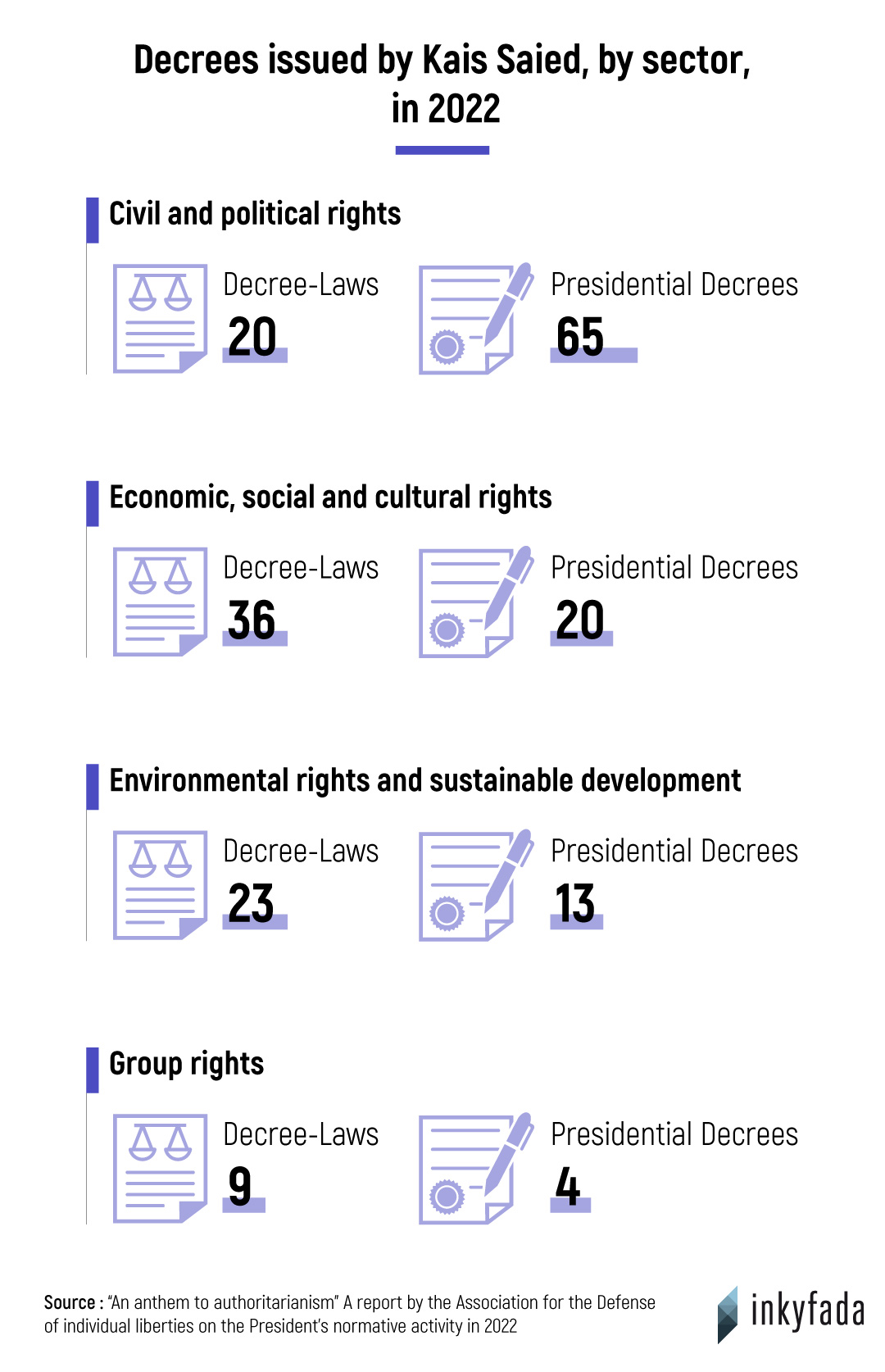
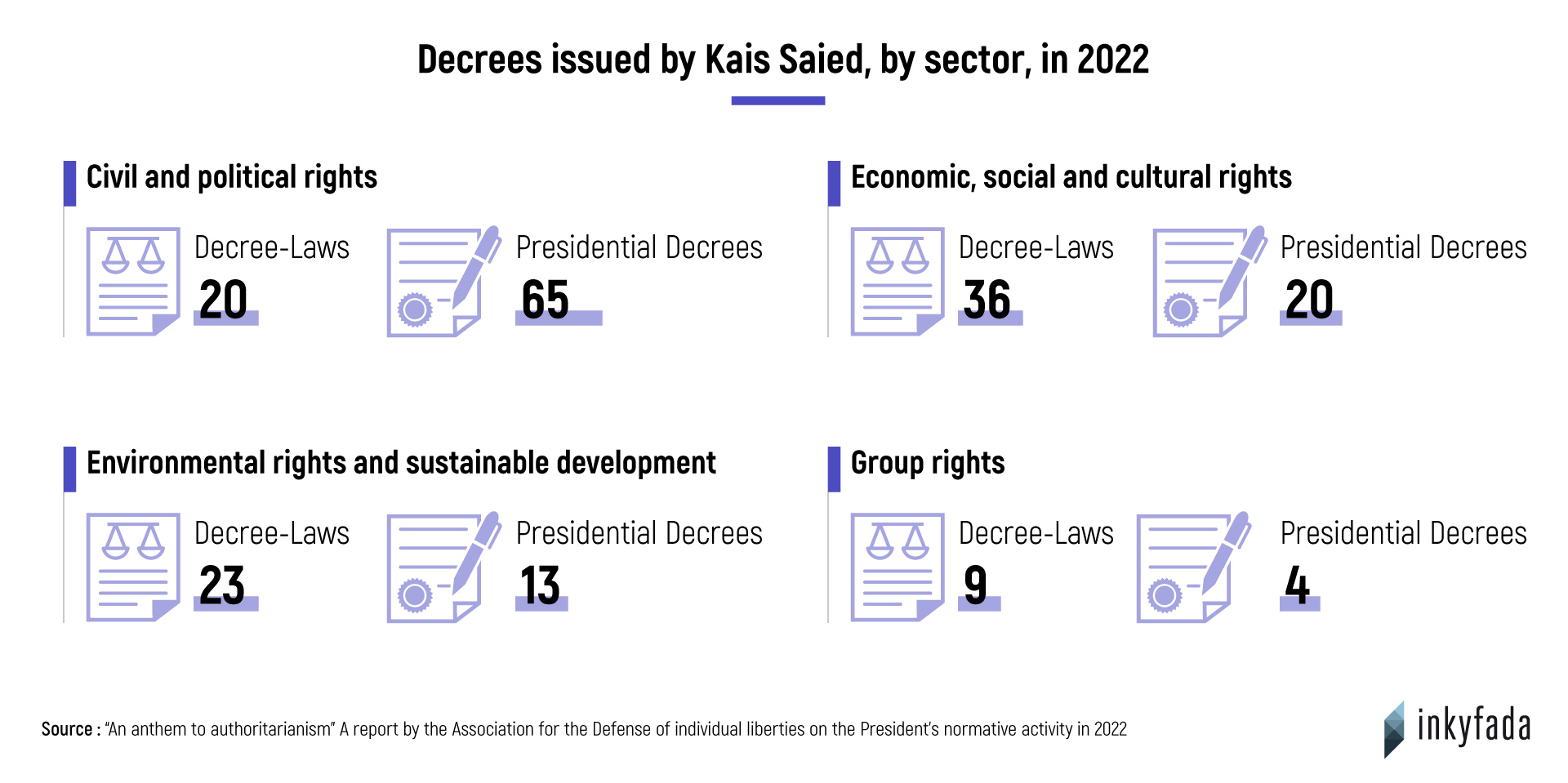
A populist scavenger hunt
After declining the International Monetary Fund's (IMF) 1.9 billion dollar aid package, President Kais Saied is now exploring alternative options to address the country's economic challenges. One of these approaches involves the recovery of the funds that were embezzled during Ben Ali’s reign and in the aftermath of the Tunisian revolution.
On the same subject
For several years now, Saied has been adamant that the money needed to get Tunisia back on its feet is now scattered all over the world. During the authoritarian rule of Zine El Abidine Ben Ali from 1987 to 2011, the Ben Ali/Trabelsi clan faced accusations of embezzling substantial amounts of public funds. Following the revolution, the Commission for Confiscation estimated their assets at around 13 billion dinars.
President Kais Saied set up an ad-hoc commission in March 2022 dedicated to the recovery of these assets. Called the National Commission of Criminal Conciliation (CNCP), its members were appointed just eight months later and given the task of recovering the misappropriated resources and allocating them to the affected areas, while at the same time paying off some debts.
Kais Saied visited the CNCP headquarters in Tunis on Tuesday June 20, 2023, demanding greater efforts to recover the assets stolen from the people, and insisting that “the retrieved sums would enable the country to become less reliant on foreign assistance”. Opposite him, Fatma Yaacoubi, a member of the commission, explained that she could recover a colossal sum of 30 billion dinars, which an exiled Tunisian businessman had allegedly made available after applying for reconciliation. Astonished at the time, the President made Fatma Yaacoubi repeat the sum. “30 billion, meaning thirty thousand million dinars”, she insisted.
This revelation sounds especially enticing to the President, who has been trying to find an alternative to the IMF for several months now. “If such a sum could come from one single person, we wouldn't have to borrow from any institution,” he contemplated with intrigue.
The web went wild over the next few days, ridiculing Fatma Yaacoubi's "billions". Upon verification, the family of the man who had promised his fortune to the CNCP confirmed that he was actually bankrupt. On July 7, Kais Saied issued a new decree and Yaacoubi was dismissed from her post with immediate effect.
If the President has come in person to press for action, it's precisely because the embezzled funds are unlikely to be recovered. This is primarily because they have been transferred to foreign accounts, particularly in Switzerland, France, and Canada, making them irretrievable. A large number of assets, such as real estate, yachts and luxury cars, have also been acquired, preventing Tunisia from taking the necessary steps to recover them.
This measure, so dear to Kais Saied's heart, seems more populist than ever, given the sources on which it relies. One of the reports mentioned by the President is that of the late Abdelfattah Amor and the members of his commission, whose findings have been deemed questionable. The previously mentioned 13.5 billion dinars included bank loans, companies and illegally obtained wealth. However, some of the bank loans have been repaid, and some companies have been sold or reduced in value. As for the ill-gotten gains, several owners were able to prove their legitimate origin.
Aram Belhadj, a doctor of economics, is pretty pessimistic. “The commission didn't do anything to recover the embezzled funds, Tunisia didn't receive a penny, I think it's pointless. Talking about the funds that were misappropriated during Ben Ali's time, it's a load of rubbish.”
By appointing Makram Ben Mna as president of the Criminal Conciliation Commission, Saied had set a deadline of six months for results to be delivered. Seven months later, not a single dinar has been returned to the State Treasury and the current situation suggests that the likelihood of seeing any funds is becoming increasingly slim, considering the latest developments. In a surprise visit to the commission on March 16, 2023, the President had already expressed his frustration at the lack of results, long before the 30-billion-dinar story broke. Five days later, his anger was translated into the dismissal of Makram Ben Mna, His successor has never been appointed, the surprise visits continue, and the results are yet to be delivered.
Saied has been relentlessly pursuing his project since 2011. To make it a reality, the President proceeded to dismantle State institutions, which were once considered as the gains of the Revolution. Using the need to reform a failing political system as a pretext, he used the power of decrees to impose his vision, seizing full powers and eliminating the checks and balances essential to democracy in the process. "He deconstructed more than he built," asserted Zied Boussen.
